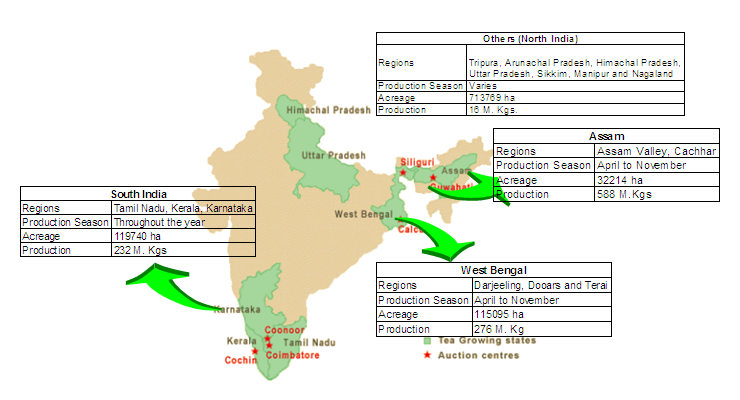Darjeeling Tea Production: Growing Concerns

Table of Contents
Climate Change and its Impact on Darjeeling Tea Gardens
Climate change significantly threatens Darjeeling tea quality and yield. Changing weather patterns, characterized by unpredictable rainfall and rising temperatures, disrupt the delicate ecosystem crucial for optimal tea cultivation. The impact is multifaceted: reduced harvests, altered flavor profiles, and increased susceptibility to pests and diseases.
- Reduced rainfall leading to water scarcity: This is a major concern, especially during crucial growing periods, impacting the tea bushes' health and productivity. Irrigation systems are often inadequate, leaving many gardens vulnerable.
- Increased temperatures affecting tea bush growth: Higher temperatures can stress the plants, leading to stunted growth and reduced leaf production. This directly translates to lower yields and potentially a change in the characteristic Darjeeling tea flavor.
- Higher frequency of extreme weather events damaging crops: Hailstorms, floods, and landslides can devastate entire harvests in a single event, causing significant economic losses for farmers. This unpredictable nature makes long-term planning extremely difficult. Implementing climate-resilient agricultural practices is paramount for mitigating these impacts on Darjeeling tea quality and the overall Darjeeling tea industry.
Labor Shortages and Wage Issues in the Darjeeling Tea Industry
The Darjeeling tea industry faces a severe labor shortage. Attracting and retaining young workers is proving increasingly difficult due to low wages, poor working conditions, and a lack of opportunities for advancement. The aging workforce and the migration of younger generations to urban areas for better prospects are exacerbating the problem.
- Migration of workers to urban areas seeking better opportunities: Young people are seeking higher wages and better living conditions in urban centers, leaving the tea gardens with an increasingly older and smaller workforce.
- Lack of attractive compensation and benefits packages: Low wages and a lack of benefits make the tea industry unattractive to young people compared to other sectors.
- Inadequate social security and healthcare provisions for workers: The lack of adequate social security nets and healthcare provisions further discourages young people from entering the profession. Addressing these labor issues is crucial for the continued production of Darjeeling tea. Fair wages and improved working conditions are essential to attracting and retaining skilled workers.
Sustainability Concerns and Environmental Degradation
Traditional Darjeeling tea production methods have raised significant environmental concerns. Excessive pesticide use harms biodiversity and soil health, while tea processing waste pollutes water sources. This unsustainable approach threatens the long-term viability of the industry and the unique ecosystem of the Darjeeling hills.
- Excessive pesticide use harming biodiversity and soil health: The overuse of chemical pesticides contaminates the soil, affects beneficial insects, and reduces the overall health of the tea gardens. This impacts the quality and long-term sustainability of Darjeeling tea production.
- Water pollution from tea processing waste: Untreated wastewater from tea factories pollutes rivers and streams, harming aquatic life and potentially impacting local communities' water supplies.
- Deforestation and loss of biodiversity in tea garden areas: The expansion of tea gardens, sometimes at the expense of forests, contributes to deforestation and the loss of biodiversity in the region. Transitioning to sustainable practices is essential for protecting the environment and ensuring the future of Darjeeling tea.
Competition and Market Fluctuations Affecting Darjeeling Tea
Darjeeling tea faces increasing competition from other tea-producing regions offering cheaper alternatives. Fluctuating global tea prices further destabilize the market, making it challenging for Darjeeling farmers to maintain profitability. Effective strategies are needed to enhance the market value and brand image of Darjeeling tea.
- Cheaper tea imports from other countries impacting sales: The influx of cheaper teas from other regions directly impacts the market share and profitability of Darjeeling tea.
- Price volatility making planning difficult for tea producers: The unpredictable nature of global tea prices makes it difficult for farmers to plan for the future and invest in improvements.
- Need for effective marketing and brand promotion: Highlighting the unique qualities of Darjeeling tea through effective marketing and branding is crucial to maintaining its premium status and market share. Protecting the Darjeeling tea brand identity through strict quality control measures is also paramount.
Conclusion: Securing the Future of Darjeeling Tea Production
The future of Darjeeling tea production faces significant hurdles: climate change, labor shortages, sustainability concerns, and fierce market competition. Addressing these challenges requires a multi-pronged approach focusing on sustainable farming practices, fair labor practices, and innovative marketing strategies. By promoting sustainable Darjeeling tea production, investing in worker well-being, and strengthening the brand image, we can ensure the long-term viability of this iconic tea. Support sustainable Darjeeling tea producers by purchasing ethically sourced tea and raising awareness about the challenges facing Darjeeling tea production. Let's work together to protect this iconic Darjeeling tea heritage.

Featured Posts
-
 Security Row Prince Harry Reveals Rift With King Charles
May 04, 2025
Security Row Prince Harry Reveals Rift With King Charles
May 04, 2025 -
 Lizzos La Concert Showcasing Her Figure
May 04, 2025
Lizzos La Concert Showcasing Her Figure
May 04, 2025 -
 Spotify I Phone App More Payment Choices For Users
May 04, 2025
Spotify I Phone App More Payment Choices For Users
May 04, 2025 -
 South Bengal Heatwave Five Districts Face Extreme Temperatures
May 04, 2025
South Bengal Heatwave Five Districts Face Extreme Temperatures
May 04, 2025 -
 Raiwaqa Fire Victim Identified Woman Age
May 04, 2025
Raiwaqa Fire Victim Identified Woman Age
May 04, 2025
Latest Posts
-
 Bradley Cooper Prioritizes Gigi Hadid Straining Friendship With Leonardo Di Caprio
May 04, 2025
Bradley Cooper Prioritizes Gigi Hadid Straining Friendship With Leonardo Di Caprio
May 04, 2025 -
 The Hadid Cooper Relationship A Calculated Move To Avoid Di Caprio
May 04, 2025
The Hadid Cooper Relationship A Calculated Move To Avoid Di Caprio
May 04, 2025 -
 Did Gigi Hadid Break The Bro Code Between Bradley Cooper And Leonardo Di Caprio
May 04, 2025
Did Gigi Hadid Break The Bro Code Between Bradley Cooper And Leonardo Di Caprio
May 04, 2025 -
 Super Bowl 2025 Bradley Cooper And 7 Year Old Daughter Lea In Matching Green Outfits
May 04, 2025
Super Bowl 2025 Bradley Cooper And 7 Year Old Daughter Lea In Matching Green Outfits
May 04, 2025 -
 Gigi Hadid And Bradley Cooper Instagram Official New Photo Sparks Dating Rumors
May 04, 2025
Gigi Hadid And Bradley Cooper Instagram Official New Photo Sparks Dating Rumors
May 04, 2025
